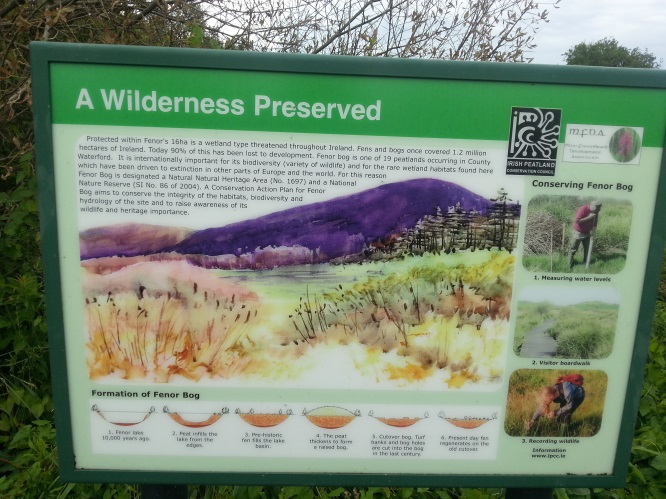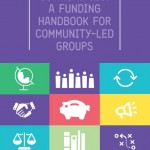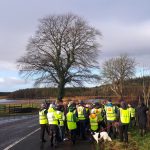The Environmental Protection Agency (EPA) has partnered with The Wheel…
Sustainable community engagement in wetlands
Ní neart go cur le chéile – there is strength in unity
Community engagement in wetland conservation can help deliver Water Framework Directive objectives. A research study was undertaken to assess stakeholder opinions and perceptions relating to community based wetland projects to identify key requirements for sustainability, i.e., achieving the dual goal of self-sustaining projects and protected ecosystems.
The study indicated the ancillary benefit of community engagement in fostering a shared environmental understanding by a process called social learning – learning together to manage together.
A mixed methods study investigated community engagement strategies at three wetland projects in Ireland:
- Abbeyleix Bog Project, Co. Laois
- Cabragh Wetlands, Co. Tipperary
- Fenor Bog, Co. Waterford
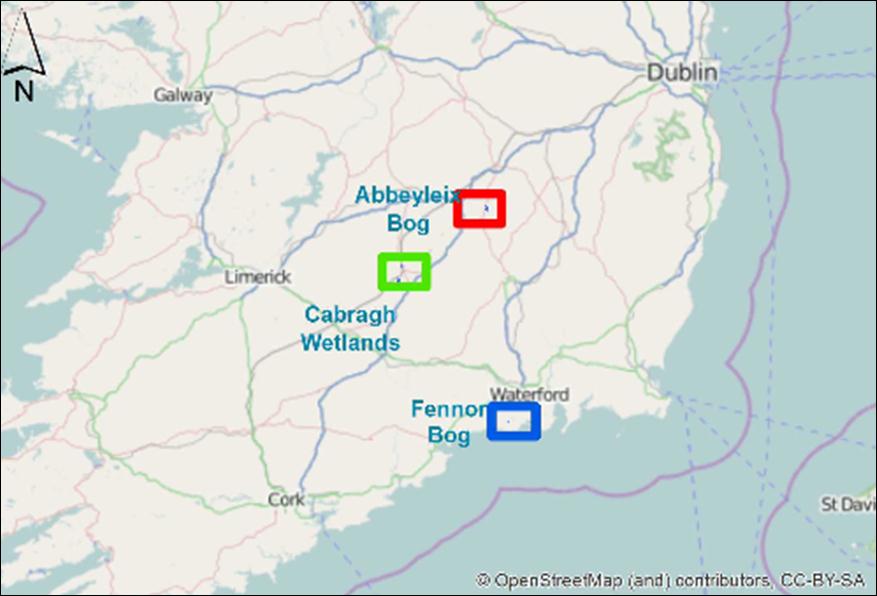
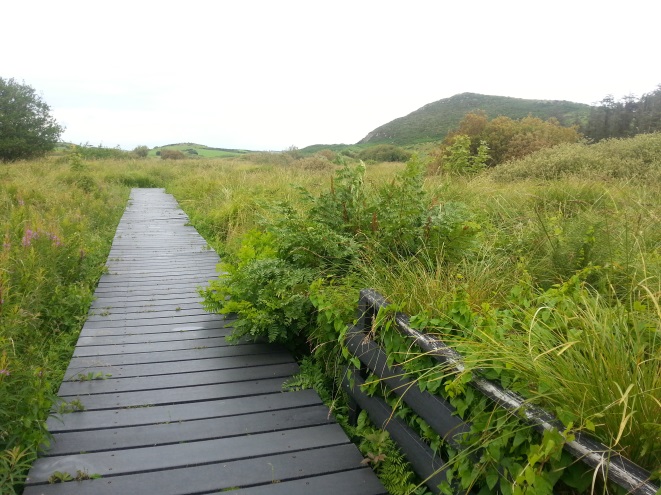
Stakeholder Surveys
Three stakeholder groups involved in the projects were surveyed – project managers, visitors/volunteers, and other users. This provided largely qualitative data on the projects and anecdotal evidence of successful community engagement. Project managers identified a number of barriers to maintaining community engagement, including funding, volunteer capacity, lack of interest amongst general public and compliance/legal issues. The table below outlines measures proposed by project managers to sustain community engagement
| Abbeyleix |
| Keep accessibility open |
| Try to get more people actively involved in the project |
| Build capacity by involving as many groups and individuals over time |
| Only commit to achievable goals while keeping the ethos of the project at the base of every decision |
| Keep organising Open Days and walks |
| Cabragh |
| Develop expert sub-committees to lead/manage different areas of operation |
| Spread the load among more people |
| Improve membership links |
| Continual evaluation of areas that could be improved |
| Use of social media |
| Hold more seminars on what Cabragh Wetlands does for sustainable development |
| Representation at national conferences |
| Develop profile |
| Fenor |
| Encourage the involvement of younger people in fundraising (sale of work, etc.) |
| Prepare educational resources as required |
| Continued involvement by Irish Peatland Conservation Council in monitoring, education and reporting. |
Key Findings
- The three projects were initiated in response to threats (i.e., landfilling, development or peat extraction).
- Open access to the public is important and a diverse range of facilities and activities is provided and/or facilitated.
- 86% of visitors surveyed reside within 20km of the wetlands.
- All stakeholders surveyed consider that:
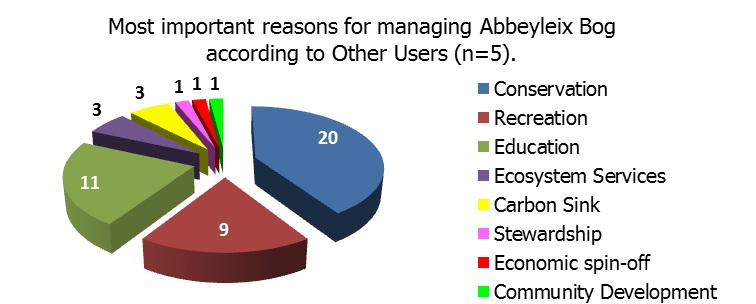
(a) Conservation is the most important reason for managing the sites (see pie chart above), with education and recreation generally of equal importance thereafter, and
(b) Wetlands are very important for Wildlife Protection, when rated for specified ecosystem services.
- 90% of project managers consider that external support is necessary to sustain community engagement.
- Administrative costs of projects range from €2,000 to more than €36,000 per annum, reflecting the degree and type of management undertaken.
Q-methodology
Q-methodology was used to analyse stakeholders’ perceptions and identify key factors for community wetland projects. Q-methodology is a tool which can be used to take qualitative (subjective) information on a topic, from a relatively small sample of the population, and subject the results to statistical analyses to provide insights into the different perspectives that exist within the population and the differences that exist between stakeholder groups (Kindermann and Gormally 2013, Ryan et al 2006). A set of twenty statements on regulatory/management support and social/education aspects of community projects was presented to participants for sorting (Q sorting) according to whether they agreed or disagreed with the statements and the level of (dis)agreement. The results were analysed using factor analysis, rotation, and principal component analysis.
Common Factors
Four common factors, which may be considered perspectives shared by stakeholders, were identified as:
(i) Socio-environmental capacity building
(ii) Integrated, multi-agency collaboration
(iii) Objective, socially inclusive governance,
(iv) Honest, progressive working relationships.
These factors highlight fundamental requirements for effective and sustainable community wetland projects from the perspective of a group of stakeholders with considerable experience and expertise in this area.
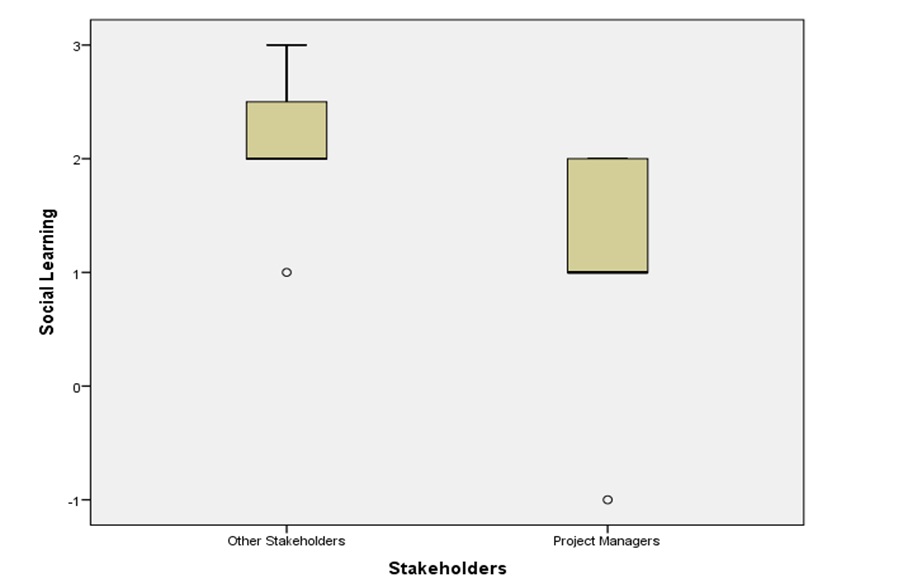
Overall, 94% (n=16) of participants agreed with the statement: “Involving various stakeholders introduces new ideas and techniques and results in learning (social learning, i.e. learning together to manage together). The chart right shows that the social learning value is marginally more perceptible to other stakeholders than Project Managers. Other stakeholders surveyed included landowner, volunteers, consultant, state and local authority personnel. Two outliers (indicated by a circle on the boxplots) ranked the social learning value lower than their respective groups. The Other Stakeholder outlier somewhat agreed (+1) with the statement while the Project Manager outlier somewhat disagreed (-1).
Ciara Maxwell
This project was completed between September 2013 and September 2015 during a MSc in Biodiversity and land Use Planning via distance learning through NUI Galway’s School of Science.
